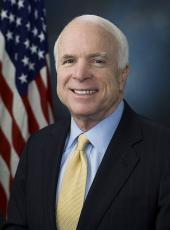
McCain Campaign Press Release - "In Case You Missed It": An Argument Against Obama's Tax Plan
"Make no mistake about it: Obama's plan to raise taxes on households making more than $250,000 will raise taxes on most small-business profits in America." --Grover Norquist
"An Argument Against Obama's Tax Plan"
Grover G. Norquist
Politico
July 11, 2008
The Tax Policy Center and the Barack Obama campaign used some sleight of hand this week in Politico. To quote Eric Tolder of the TPC, "Most small-business people, like most everyone else, are not really high-income." While this is true, it completely and totally misses the point.
Let's start with the definition of a "small business." Most will tell you that small-business income constitutes income derived from sole proprietorships, partnerships and Subchapter S corporations.
The conservative argument (and that of the John McCain campaign) is that Obama's stated plan to raise taxes on households making $250,000 or more in income is a tax increase on small business. The simple answer to this dilemma can be found in the IRS Statistics of Income Bulletin (Table 1.4, for those who are interested).
So what do the data say?
In 2006 (the latest year available), $706 billion of such income was reported to the Internal Revenue Service. Of this, about half was reported by households in the top marginal income tax rate. Interestingly, two-thirds of this income was reported by households making $250,000 per year or more -- the very same households that Obama wants to increase taxes on.
The Obama campaign maintains that the number of small-business owners is what's important. Economists know what matters is the tax rate that's applied to the bulk of small-business income. Make no mistake about it: Obama's plan to raise taxes on households making more than $250,000 will raise taxes on most small-business profits in America.
What type of tax rate are we talking about? Currently, S corporations face a top tax rate of 35 percent, while sole proprietors and general partners face a tax rate of 37.9 percent (since they're responsible for paying both income tax and the Medicare component of the payroll tax).
Under Obama's plan to let the scheduled 2011 tax rate hikes occur, and his plan to raise the self-employment tax on those making more than $250,000, the S corporation rate would rise from 35 percent to 39.6 percent. The sole proprietor and partner rate would rise from 37.9 percent all the way up to a staggering 50.3 percent. Many Democrats in Congress have proposed making all small businesses (including S corporations) pay this 50-plus percent rate. A small business tax rate that high would be the highest marginal rate faced by them in nearly a quarter-century.
What would a world look like where two-thirds of all small-business income would be taxed at a 50 percent rate? The economic law that "taxing something more and getting less of it" would apply. Fewer Americans would be interested in opening or expanding small businesses. Tax evasion and legal tax avoidance would spike, as tax shelters would once again become a booming industry. Since small businesses create a majority of jobs in America, Main Street closing up shop will have a direct impact on the family budget, as well. Plants and equipment will go unused. Despite the misguided opinions of static scorers in Washington, federal tax revenues will likely decline as the economy staggers into a full-on recession.
What's the alternative? One place to look is the optional alternate tax system originally proposed by Congressman Paul Ryan (R-Wis.) and now endorsed by McCain. It would give households (including those with small business income) a choice between the current tax code and one with a top rate of 25 percent on all income over $100,000. This would have the beneficial effect of lowering the tax rate on most small-business income by 10 percentage points. Small businesses haven't faced a tax rate that low in quite some time and would be likely to respond with the creation of new businesses and more investment in existing businesses.
The McCain small business tax plan doesn't end there. For those businesses that are organized as conventional corporations, the top tax rate would fall from 35 percent to 25 percent, the European average. For all businesses, technology and equipment -- which now must be slowly "depreciated" over many years -- would be immediately expensed in year one.
Stepping back, voters and policymakers should ask themselves whether they want two-thirds of small business income taxed at a 50 percent tax rate or if they want nearly all small-business income taxed at a 25 percent tax rate. They should ask themselves whether it's healthier for small businesses to write off a computer over six calendar years or to simply write it off in year one. To America's small business sector, the answer is obvious.
ReadThe Op-Ed
John McCain, McCain Campaign Press Release - "In Case You Missed It": An Argument Against Obama's Tax Plan Online by Gerhard Peters and John T. Woolley, The American Presidency Project https://www.presidency.ucsb.edu/node/291728
